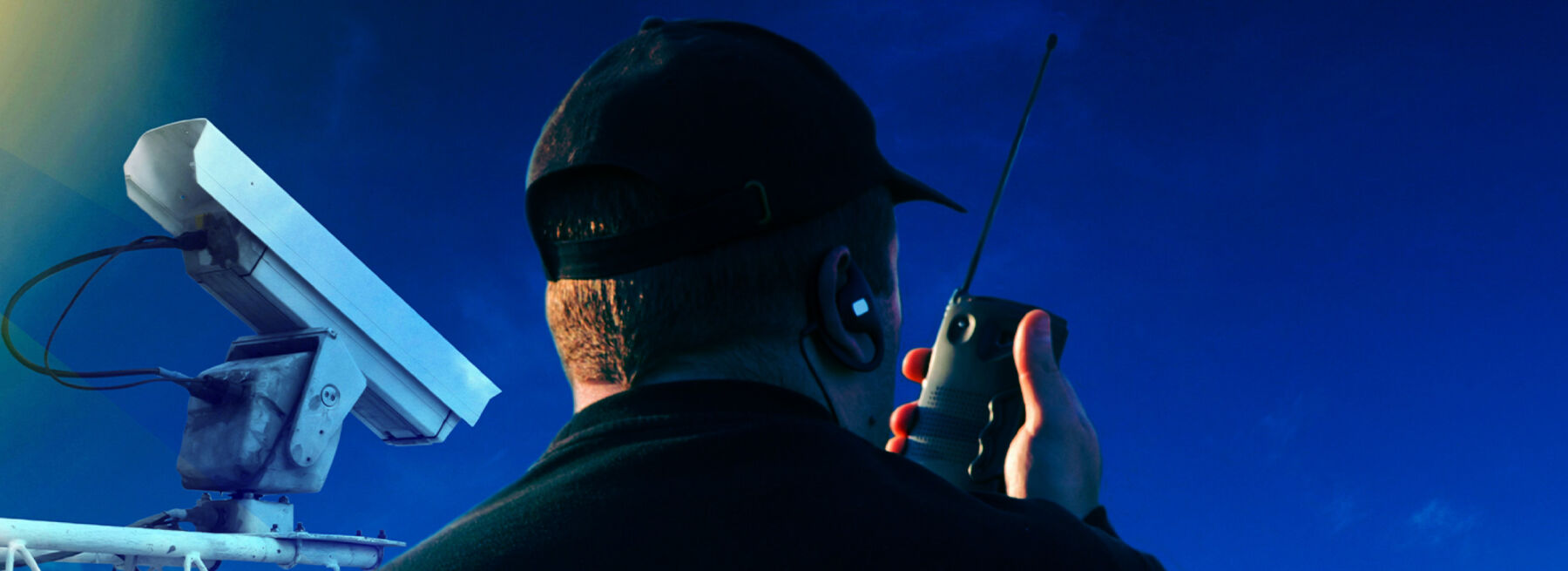In times of increasing economic uncertainty, businesses are taking concrete steps to reduce overhead and operational expenses to stay afloat. From deterring criminal behavior by transients to ensuring internal safety for employees, security is expanding and becoming an increasingly expensive requirement.
Security guards are trying to keep up with the complex demands of their customers, but they are frequently failing to fulfill their duties. More and more companies are openly discussing whether they should replace physical security with a tech-centric security solution, such as live monitoring of security cameras.
Historically, companies have relied on physical security guards to ensure employee and facility protection. In-person security can guide visitors, respond to intruders, and provide a general deterrence against criminal behavior. It’s a time-tested business practice.
But with increasing homelessness, social tensions, and economic uncertainty, physical security is under increased pressure to always perform diplomatically and professionally.
Security Guards Are Often Overpriced, Overextended, and Under-Trained.
According to the Bureau of Labor Statistics, the hourly pay for a physical security guard is between $13 and just under $28, depending on the state in which they work. A single guard who is paid $15 an hour would earn roughly $31,200 a year. There are no standard national training requirements, so there are major differences in the quality and professionalism of security guards depending on where they are employed.
To further complicate things, because security guards are often hired through third-party companies, they may not be familiar with the policies of the company they are hired to protect, which could create public relations issues for the client.
Security Guards in the News
In recent years, there have been a number of high-profile lawsuits due to misconduct from physical security.
For example, General Motors in Detroit is facing a hostile workplace lawsuit due to allegations that their security guards used racial slurs toward employees and visitors. GM responded to the allegations by removing the guards in question, but the damage had already been done. The case is currently pending with expected litigation in 2025.
In 2021, the Southeastern Pennsylvania Transit Authority, SEPTA, made national news when multiple passengers were violently assaulted by third-party physical security hired by the city. These high-profile assaults caused SEPTA to alter their contracts and utilize “guides” to ensure passenger safety. President of the SEPTA Police Union, Omari Bervine, later commented on security misconduct, saying “It makes the security guards more of a hindrance when we have to expend manpower answering jobs and calls involving them.”
Aside from the negative publicity, lost business, and pending lawsuits, security guard misconduct can also cause increases in insurance premiums, which can hurt businesses even further on the back end.
According to insurance trade newsletters, there have been considerable increases in insurance premiums for security guards over the past eight years. During the COVID-19 pandemic, security guards were tasked with performing temperature checks and verifying vaccination status. Insurance firms responded by adding “Virus Exclusion language” to insurance contracts, which ultimately drove up costs.
The more open drug culture in the United States has also had an impact on security premiums. With the rise of cannabis and alternative drugs in recent years, there have been a number of high-profile violent altercations at cannabis dispensaries. Even if a security guard is protecting a facility from an intruder, there is no guarantee how a jury will respond to a lawsuit. According to Kelly Hafkey, Senior Account Executive with Lizzo’s Insurance Services, “General liability rates for security guard companies continue to increase because jury awards are increasing.”
Live Video Monitoring: Technology + Human Intelligence
Live video monitoring provides an advanced security solution for the transportation and logistics industry by combining advanced technology with trained security personnel. Surveillance cameras, strategically placed around the property, are monitored in real time by trained monitoring operators who can quickly identify and respond to suspicious behavior like unauthorized access, cargo tampering, vehicle misuse, and other potential threats.
These trained security professionals can use audio warnings to communicate with trespassers as well as contact onsite security and local authorities. By monitoring in real-time, potential incidents can be addressed promptly, helping to mitigate risks, protect assets, and ensure the efficient flow of goods and services.
Live Video Monitoring and Security Guards Working Together
Many mid-market and enterprise customers still use security guards to perform critical functions. But now, these guards are collaborating with live-monitoring security companies to coordinate and synergize facility security. Live video monitoring can become the eyes and ears, while physical security guards can patrol the perimeter and respond to security threats.
In the end, it doesn’t have to be a choice between live video monitoring and having security guards on the ground. They can work together to create a stronger security system. While video monitoring keeps an eye on things with technology, security guards can handle on-the-spot situations and deal with people in a more personal way. This is a smart way for businesses to protect themselves while using their resources wisely.
By combining the two, companies can reduce the number of guards needed onsite while still maintaining comprehensive security coverage, potentially leading to significant cost savings while creating a security plan that fits their unique needs and level of risk.
As threats continue to change and grow, the future of security lies in finding ways to work together, using both technology and human intelligence. This can help companies stay ahead of potential problems and make the most of their security investments.
For more information about how live video monitoring can help safeguard transportation and logistics businesses for up to 60% less than the cost of guards, contact us.
Texas Private Security License Number: B14187
California Alarm Operator License Number: ACO7876
Florida Alarm System Contractor I License Number: EF20001598
Tennessee Alarm Contracting Company License Number: 2294
Virginia Private Security Services Business License Number: 11-19499
Alabama Electronic Security License # 002116
Canada TSBC License: LEL0200704

